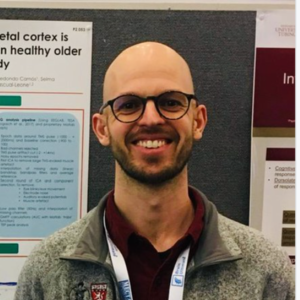As a young man growing up in the United Kingdom, Timothy Morris did not predict he would be a researcher. “In high school,” he recalled, “I had no idea I wanted to be an academic.” Now, he works as a postdoctoral researcher of neuroscience at Northeastern. Morris currently studies the neural effects of lifestyle choices and environmental factors — such as educational opportunities, enriching life activities, and exercise — on cognitive functioning.
Morris’s route to Northeastern was a winding path across continents, and along the way, he explored many different types of research. Beginning his higher education at Aberystwyth University in Wales, his interests shifted from sport and exercise science to neuroscience, and he wanted to seek out more research opportunities studying the brain. However, his past experience lingered with him on his search: “I couldn’t get away from my exercise background,” he explained. “I didn’t really want to study exercise anymore.”

As a result, Morris combined his previous knowledge and his new interests. At the Autonomous University of Barcelona in pursuit of his master’s degree, Morris studied modifiable lifestyle activities and resulting effects on cognitive health in rodent models. In combining these interests, Morris noted, “I realized how amazing it actually is — this modifiable lifestyle factor is so powerful.” Although it was previously known that lifestyle factors affect brain health, defining and exploring precisely how these activities affect the brain is incredibly important for understanding how to improve cognitive health — and Morris found his passion in exploring this relationship.
Morris’s academic career grew as a result of his ambition to explore neuroscience. After working with rodent models to study physical activity and traumatic brain injury, he wanted to translate his research to human populations. This idea was accepted at the Institut Guttman, a neurorehabilitation hospital where Morris pursued his PhD through a feasibility study, determining if his research question could be translated to human populations.
By asking scientific questions and presenting his ideas to universities and advisors, Morris’s academic path revealed itself. This inner aspiration guided him to his current advisors who lead the Center for Cognitive and Brain Health at Northeastern. “They’re the reason I chose to come here. I asked to do a postdoc with them, and they graciously accepted.”
Through eager pursuit of his interdisciplinary research goals, Morris gained support for his postdoctoral research at Northeastern and produced his most recent publication, analyzing the relationships between enriching early-life experiences and cognitive function in later life. This research is relevant to all people, as maintaining cognitive abilities throughout one’s life is a universal desire. This most recent paper discusses cognitive reserve and brain plasticity — two concepts that can be used to describe the brain throughout life. Cognitive reserve refers to adaptability of the brain in response to natural aging, injury, or disease — all of which are capable of reducing cognitive abilities such as processing and attention. While cognitive reserve refers to the brain’s ability to adjust to degradation or damage, plasticity refers to the brain’s ability to adapt to novel, varying stimuli in a changing environment.
Morris’s study expanded upon the previous life-course model of cognitive reserve, a model developed by researchers Marcus Richards and Ian Deary that proposed different factors throughout life, such as early environments, education, and lifestyle, determine brain structure and function. To further explore this concept, Morris and his collaborators studied whether cognitively, socially, and physically stimulating environments in early life would affect cognitive abilities in old age among individuals with no greater risk for cognitive decline, since this demographic had not previously been studied.
Through retrospective questions, participants were asked to recall early-life experiences from their childhood, such as “Did you take art, dance, or music lessons?” This type of yes or no question is designed for low recall bias, meaning participants have a lower chance of incorrectly remembering or altering answers and are more likely to respond honestly. The cognitive performance of participants was also assessed through tasks used to evaluate different types of cognitive abilities. Through statistical and mediation analyses, Morris demonstrated that higher engagement in enriching early-life activities was correlated with more educational attainment. He suggests that improved brain plasticity as a result of greater engagement in these activities may be due to neural changes during a critical period of development or the incorporation of similar activities throughout the lifespan.
Cognitive decline and neurodegenerative disease are not inevitable consequences of aging, as Morris cites in his paper. It is possible for some individuals to age and maintain their cognitive function, and Morris’s research regarding the impacts of engagement in enriching early-life activities or being physically active will help elucidate how aging gracefully can be achieved. Although exercise has been scientifically shown to have beneficial health effects, Morris added, “It’s so much easier for us to come home at the end of the day and see the sofa, and go ‘I’m going to sit on that and watch TV’ instead of engage in an exercise routine.”
After his experiences with both clinical and academic research, Morris has found his calling in academia. “I’m very happy here at Northeastern… I like the people, the pure academics are… collaborative, friendly.” After his experience with clinical research, he found he wanted an environment with more mentorship and collaboration. “I enjoy mentoring students; collaboration across PIs and centers [at Northeastern is] encouraged.” One of his collaborators in his most recent paper, Meishan Ai, is a graduate student at Northeastern studying psychology with a focus in cognition. Morris said this collaboration and mentorship are what he truly enjoys about the academic environment and working as a postdoctoral researcher.
“Right now, I am mostly working with datasets… analyzing data, developing analysis pipelines, and writing papers. Once coronavirus is over, I hope to work again with human subjects.” A sentiment shared among so many, Morris anticipates continuing to enjoy the environment at Northeastern following the pandemic. “I’m excited that everything seems like it’s on track to have everyone back in person in the fall.”

